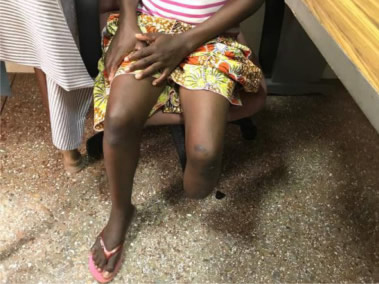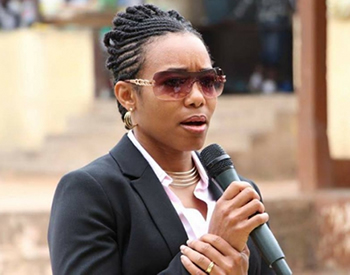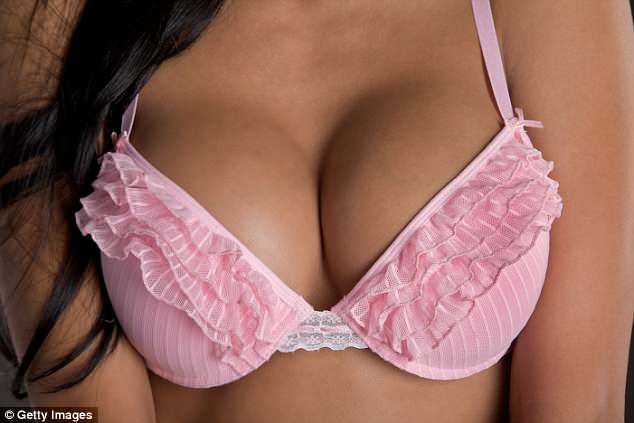Disabled, Yet, Empowered
- Home
- Disabled, Yet, Empowered

Disabled, Yet, Empowered

I was neglected, abused, called names by my husband, and by some family members, and was left to suffer the ordeal of becoming disabled through no fault of mine, the ordeal of Ms Christiana Fosua.
Ms Fosua, now 39 years old, was happily married with three children, self-employed and was into a floral decoration for several years until the COVID-19 pandemic era when her business collapsed.
She, however, got the opportunity to work at a toll booth as a toll collector but her job, unfortunately, was stalled after she was involved in a ghastly motor accident, which led to the loss of her legs.
Ms Fosua explained that her disability worsened when on one faithful day she was run over by a vehicle in another accident at the toll booth, her place of work, which led to one hand being partially affected.
Despite the add-on to my woes, I was hoping to recover fully and return to my job but unfortunately, the government in 2021 cancelled road toll collection nationwide,” she added.
She said her inability to fend for herself due to the development made her reliant on her husband, which led to neglect and abuse from him, her own family, the church, and society.
I also suffered attempted rape on several occasions but through sensitization exercises as part of activities to commemorate 16 Days Activism against Sexual and Gender-Based Violence, I was empowered, and felt the need to report my husband to the Domestic Violence Victims Support Unit (DOVVSU) of the Ghana Police Service, for him to take care of the children.
Ms Fosua said she was also able to report some of the men who tried to rape her, but the case was delayed and after three years, she has not been able to seek justice, “which I feel it’s due to my condition.”
“I was, however, fortunate to have come across Voices of Women and Children (VOWAC), Ghana, a non-governmental organization (NGO) for empowering me and other women and children with disability.
“As we speak, the NGO has secured a scholarship for my three children. The firstborn, a boy, is at the tertiary level, the second a girl, at the Junior High level, and the last born is at the primary level.
“I am doing well now by depending on charity, and support from groups and individuals but the question is how far can I go with this?
The 16 Days Activism Against Gender-Based Violence is an International Campaign to challenge violence against women and girls, which starts from November 25, the International Day for the Elimination of Violence against Women, to December 10, Human Rights Day.
It was initiated in 1991 by the first Women’s Global Leadership Institute, held by the Centre for Women’s Global Leadership (CWGL) at Rutgers University.
Since its inception over 6,000 organizations from approximately 187 countries have participated in the campaign.
Gender-based violence (GBV) or violence against women and girls (VAWG) is described as a global pandemic that affects one in every three women during their lifetime.
The violence and discrimination suffered by women are key barriers to the realization of their rights and the achievement of social justice.
Of all the human rights abuses recorded globally, violence against women such as domestic abuse, trafficking, rape, or harmful cultural practices such as child marriage, female genital mutilation, witchcraft accusation, and many others are the most widespread.
A recent Afrobarometer Meter report indicates that in Ghana, the most recent Demographic and Health Survey reported that 36.6 per cent of women had experienced physical violence since age 15, as compared to 17.2 per cent during the previous year, Ghana Statistical Service 2009.
About one in four Ghanaian women have suffered physical and /or sexual violence by an intimate partner UN Women, 2022 report has indicated.
Media reports from the Ghana Police Service indicated that a total of 16,000 cases of domestic violence were recorded in 2022.
The 16 Days Activism has for the past five years, been centred on the need to stand against all forms of violence against women and girls at all levels, to end the menace in Ghana and the world at large.
Gender-based violence is enacted under many different manifestations, from its most widespread forms, intimate partner violence, physical, sexual, psychological, and economic.
In ensuring intensified advocacy to end GBV in the country, the Ministry of Gender, Children and Social Protection (MoGCSP), in 2021 through the Domestic Violence Secretariat (DVS) launched Ghana’s first-ever ‘Domestic Violence Information Portal.’
This move demonstrates MoGCSP’s commitment to providing a one-stop-shop database on Domestic/Sexual and Gender-Based Violence and Child Marriage in Ghana.
The Domestic Violence Information Portal was developed by the Ministry of Gender in collaboration with UNFPA to provide and enhance data sharing amongst all stakeholders in the fight against Domestic/Sexual and Gender-Based Violence and Child Marriage.
Mrs Beatrice Akua Mahmood, the Acting Executive Director of VOWACGHANA, urged the government to pay special attention to issues affecting women and girls with disability.
She said persons with disability continued to suffer multiple challenges like discrimination and sexual and social exclusion in the country rendering them vulnerable and marginalized in society.
Reverend Aku Xornam Adzraku-Kevi, the Executive Director of Purim African Youth Development Platform (PAYDP), a Non-Governmental Organisation, said despite the advancement in the fight against sexual and gender-based violence the menace persisted in communities.
“A cursory look at communities indicates that there are still stereotypes about the role of women and men due to the cultural and traditional context we find ourselves.
Even religious organizations and bodies are still not sure about what God is saying about the role of women and men, so, one realizes that this gap is making way for these kinds of abuses and all sorts of things,” she stated.
According to Rev Adzraku-Kevi, the 16 Days of Activism has created the needed awareness and every opportunity to celebrate the day brings out more issues.
“We have still not dealt with the issues because there are still communities who do not understand why women should not be abused, and who do not understand why girls should not be married under age 18.
One of the critical areas in all of these is the lack of political will because, even in some communities they lack the will to report cases. In some instances, it is even chiefs who are supposed to fight against some of these things that are marrying the children and some also abuse their wives.
Men are more sensitized now, but their commitment is needed to put an end to Sexual and Gender-Based Violence in the country.
Moving from policy to action, that is where the challenge is, but she is hopeful that with continuous awareness creation, with time people would start to appreciate it nationally and make it easy to bring defaulters to book.
She said there were a lot of issues that are not being discussed such as betrothal, among others which makes it clear that beyond just education there was the need to permeate religion, and tradition and help people understand that women are not properties.
“So, beyond just education, we need to discuss what the Quran, Bible, and tradition are saying about the role of a woman at the lower level. By so doing we will not only focus on women and girls but boys as well.”
M.rs Mercy Acquah-Hayford, the National Coordinator of Inerela+ Ghana, a non-governmental organization, told the GNA in an interview that the 16 Days of Activism campaign had brought so much enlightenment to women in communities.
“Now, women know what they should do during an abuse and are also able to report defilement and rape cases which hitherto would have been swept under the carpet.”
Mrs Acquah-Hayford bemoaned that despite the progress made in sensitizing people on gender-based violence issues including domestic violence, widowhood rites, and Female Genital Mutilation (FGM) was still ongoing secretly in some communities.
She explained that women in some instances, were the ones who perform these rites and asked that people change the perceptions they have on these issues.
The National Coordinator called on the Ministry of Gender, Children, and Social Protection to be up and doing and liaise with NGOs like Inerela+ Ghana to provide communities with the required education to end SGBV in the country.
She appealed to the government and organizations to provide some financial support to enable them to continue with the sensitization in these hard-to-reach communities.
Hajia Rukaya Suleiman, Kotokoli Queen mother of Ayawaso North Constituency in the Greater Accra Region, explained that 16 Days of Activism has become an eye opener among her constituents, and as such more cases were being reported daily.
She said the situation has called for more support for victims and survivors as they need all the assistance they could get from the government and philanthropists.
Mr Anthony Brenya, a Gate Keeper of Tema Station, Tudu, Art Center, and Akuma Village Head Porters, told the GNA during a workshop on SGBV and child marriage that but for the training he would not have known that sexual harassment was against the fundamental human rights of women.
“I have really been educated at this workshop and I now know that sexual harassment and verbal abuse is an offence under the law,” he stated.
.Ms Asmau Yanupi, a Head Potter, noted that an outreach initiative by UNFPA on 16 Days of Activism empowered her to report her boyfriend after he abused her severally.
She advised girls and women to also be assertive and speak up when various forms of abuse were being meted out to them as it is against their basic human rights.
By Samira Larbie
Source: GNA
Classic Ghana
Classic Ghana brings you into a fun world of arts, entertainment, fashion, beauty, photography, culture and all things in between. Let’s explore these together!


